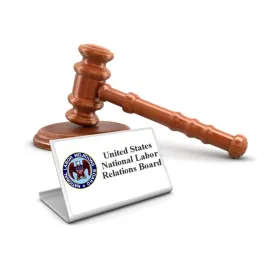The National Labor Relations Board (NLRB) issued a recent decision that impacts the use of non-disparagement and confidentiality clauses in employee agreements. In the McLaren Macomb decision, the NLRB concluded that non-disparagement and confidentiality clauses infringe on an employee's rights under the National Labor Relations Act (NLRA) because they may dissuade protected employee activity. This decision has broad implications for all employers (not just those with a unionized workforce) whose employment templates contain such clauses.
The NLRA is a federal law that guarantees all workers, unionized or not, the right to collectively seek better working conditions without restraint or interference from their employers. Section 7 of the NLRA specifically protects employees' right to engage in concerted activity "in the interest of mutual aid or protection." Examples of protected concerted activity under the NLRA include two or more employees discussing wages, benefits or other work-related issues such as safety concerns; or co-workers joining together to speak with their employer, government agencies or the media about work-related issues.
Prior NLRB authority permitted employers to use separation agreements that prohibited a former worker from disparaging the company and disclosing the terms of the severance package. The NLRB has now reversed course, holding that such prohibitions tend to "chill" protected activities by inhibiting public statements about workplace problems and limiting employees' freedom to compare separation benefits. The NLRB also emphasized that non-disparagement and confidentiality clauses may coerce employees not to exercise their right to file a charge for unfair labor practices or participate in an NLRB investigation. To fully protect worker rights, the NLRB held, an employer violates the NLRA by merely proffering an agreement that contains a non-disparagement or confidentiality clause infringing on protected concerted activity, irrespective of whether the employee signs the agreement or not.
What Employers Need to Know
While the decision has broad ramifications, employers should note two important caveats. First, the NLRA does not apply to supervisory employees. Under the Act, "supervisors" are individuals who have the authority to: (1) make decisions regarding the employment of others, including decisions to hire, discharge, promote, assign, reward or discipline; (2) direct the work of others; and/or (3) to recommend such actions; provided that such authority requires the use of independent judgment and is not merely routine or clerical in nature. Thus, employers may continue to use broad non-disparagement and confidentiality provisions in agreements reached with executives and employees with managerial responsibilities.
Second, the NLRA protects only those concerted employee activities that are for the purpose of "mutual aid and protection." While the NLRB has taken an expansive view of such activity, the NLRA does not grant an unrestricted right to engage in activities that fall outside that purpose. Accordingly, employers may be able to justify non-disparagement and confidentiality clauses for purposes beyond the ambit of the NLRA, so long as they provide a carve-out for conduct protected by Section 7 of the NLRA.
In light of the McLaren Macomb decision, employers should review their template agreements to ensure they comply with the NLRB's ruling. Non-disparagement and confidentiality clauses are most typically found in separation agreements, but also may be present in restrictive covenant and executive employment agreements and in employee policies governing confidentiality, use of social media and other similar matters. One solution for employers may be to include "carve out" language in the agreements stating that nothing in the agreement shall prevent the employee from engaging in legally protected concerted activity.
Conclusion
The McLaren Macomb decision is likely to face appeal, so the ultimate fate of non-disparagement and confidentiality clauses in employee agreements is not yet sealed. In the meantime, employers should ensure that any separation or other agreement they wish to use with non-supervisory employees either omits any non-disparagement or confidentiality provisions, or includes a carve-out for the employee's exercise of Section 7 rights under the NLRA.
Andrew Schuyler and Jill Settlemyer also contributed to this article.









 />i
/>i

